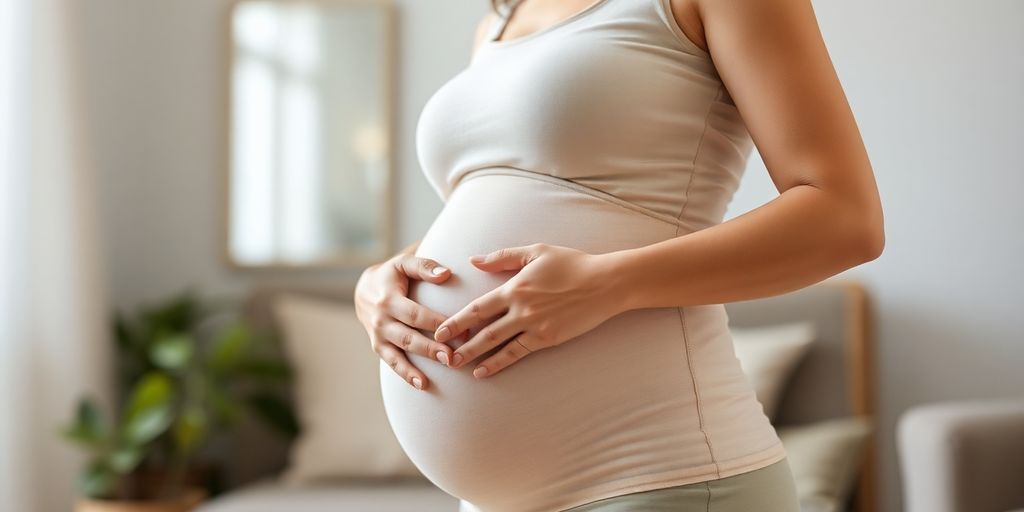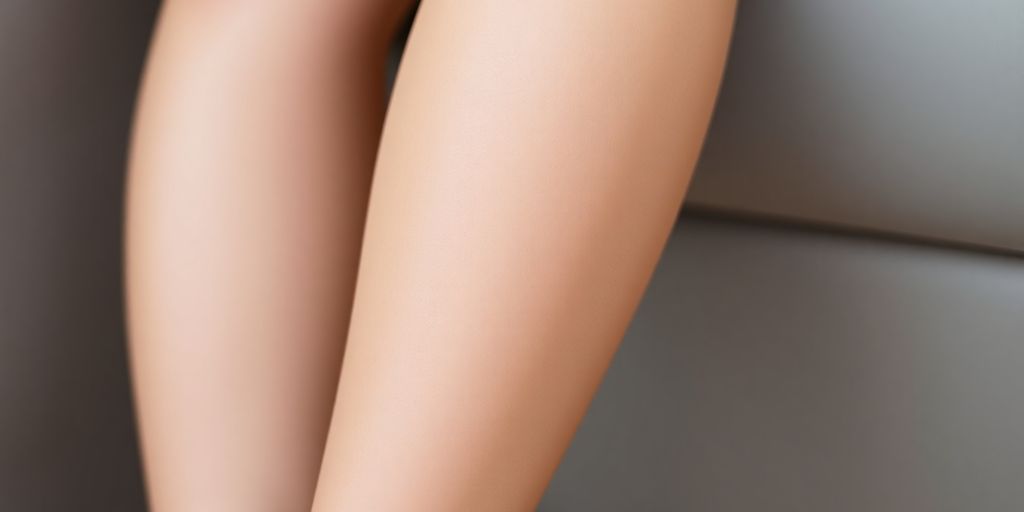Pregnancy and the time after childbirth bring a lot of changes to a woman's body. It's a journey filled with joy, but also some aches and pains. This is where compression for maternal support comes in. These special garments can really help moms feel better and recover more easily. They offer comfort and stability, making a big difference during this important time.
Key Takeaways
- Compression garments help ease discomfort and strain during pregnancy.
- They can speed up recovery after childbirth, including C-sections.
- Different types of compression for maternal support garments exist, like bands and socks.
- Compression helps with swelling, varicose veins, and joint stability.
- Always talk to a doctor before using compression products to make sure they are right for you.
Understanding Compression for Maternal Support During Pregnancy

Alleviating Discomfort and Strain
Pregnancy brings about a lot of changes, and with those changes often comes discomfort. Compression garments can be a real game-changer here. They work by gently supporting your growing belly and redistributing weight more evenly. This can take a load off your back, hips, and pelvis. Think of it like a constant, gentle hug that helps you get through the day with a little less ache. It's not a cure-all, but it can definitely make those everyday tasks a bit more manageable.
- Reduces pressure on the spine
- Supports abdominal muscles
- Minimizes strain during movement
Promoting Better Blood Flow
One of the key benefits of compression is its ability to improve circulation. During pregnancy, your blood volume increases, which can sometimes lead to swelling and varicose veins. Compression garments, especially maternity compression socks, can help counteract this by gently squeezing your legs, encouraging blood to flow back towards your heart. This can reduce swelling in your ankles and feet, and even help prevent more serious circulatory issues. It's like giving your blood vessels a little boost to keep things moving smoothly.
Enhancing Mobility and Posture
Pregnancy can throw off your center of gravity, making it harder to move around comfortably and maintain good posture. Compression garments, particularly support bands, can provide extra support to your core and lower back. This can help you stand taller, move more easily, and feel more stable. It's not about restricting movement; it's about providing the support you need to stay active and comfortable throughout your pregnancy.
Wearing compression garments during pregnancy can be a simple way to address some of the physical challenges that come with it. It's all about finding the right fit and level of support to meet your individual needs. Always consult with your healthcare provider to determine what's best for you and your pregnancy journey.
Postpartum Recovery with Compression for Maternal Support
Postpartum recovery is a challenging time, and compression garments can be a real help. They're designed to support your body as it heals and adjusts after giving birth. It's not a magic fix, but it can make a noticeable difference in comfort and recovery.
Speeding Up Healing and Reducing Discomfort
Compression garments can aid in reducing swelling and discomfort by providing gentle support to the abdominal area. This support can be especially helpful in the early days and weeks after delivery. It's like a gentle hug for your body, helping it to feel more secure and supported as it recovers. Think of it as an extra layer of support while your body is working hard to heal. Postpartum compression leggings can be a great option.
Supporting Affected Areas Post-Pregnancy
Pregnancy changes your body, and postpartum compression can target those specific areas. This includes the abdomen, hips, and back. The support helps to stabilize these areas, which can improve posture and reduce strain. It's about giving your body the extra support it needs to realign and recover.
Aiding C-Section Recovery
For those who have had a C-section, compression garments can be particularly beneficial. They can provide support to the incision area, which can reduce pain and promote healing. The gentle pressure can also help to minimize scarring. It's important to choose garments that are specifically designed for C-section recovery to ensure proper support and comfort.
Postpartum compression garments can be a great tool for recovery, but it's important to listen to your body and not overdo it. They should be comfortable and supportive, not restrictive or painful. If you have any concerns, talk to your doctor or midwife.
Types of Compression for Maternal Support Garments
Maternity Support Bands and Belts
Maternity support bands and belts are designed to provide support to the lower back and abdomen during pregnancy. They come in various styles, from basic bands to more structured belts with adjustable straps. The main goal is to alleviate pressure and discomfort caused by the growing belly. These bands can help improve posture and reduce strain on the back muscles. Some women find them particularly helpful during physical activity or when standing for long periods. It's worth noting that while many women find these bands helpful, it's a good idea to chat with your doctor before using one, just to make sure it's right for you.
Maternity Compression Socks
Compression socks are a popular choice for pregnant women due to their ability to improve blood circulation and reduce swelling in the legs and ankles. During pregnancy, blood volume increases, and hormonal changes can affect blood vessel elasticity, leading to discomfort and potential complications like varicose veins. Compression socks apply gentle pressure to the legs, helping to promote blood flow back to the heart. They are available in different compression levels, so it's important to choose the right one based on your needs and doctor's recommendations. I found that wearing them made a huge difference during my third trimester when I was constantly on my feet.
Postpartum Recovery Garments
Postpartum recovery garments are designed to support the abdomen and pelvic area after childbirth. These garments can help to reduce swelling, provide support to weakened muscles, and improve posture. They come in various forms, including wraps, girdles, and high-waisted leggings. Some women find them particularly helpful after a C-section, as they can provide support to the incision area and reduce pain. It's important to choose a garment that fits well and is comfortable to wear. I remember feeling so much more secure and supported when I wore a postpartum wrap after my delivery. It really helped with my recovery.
Choosing the right compression garment involves considering several factors, including the level of support needed, comfort, and personal preferences. It's always a good idea to consult with a healthcare professional to determine the best option for your individual needs and circumstances. They can provide guidance on proper fit and usage to ensure you get the most benefit from the garment.
Here's a quick rundown of things to consider when picking out your garments:
- Purpose: What specific issue are you trying to address (back pain, swelling, etc.)?
- Comfort: Can you wear it for extended periods without discomfort?
- Fit: Is it the right size and shape for your body?
Health Benefits of Compression for Maternal Support

Reducing Swelling and Varicose Veins
One of the most noticeable benefits of compression garments is their ability to combat swelling, especially in the legs and ankles. During pregnancy, increased blood volume and hormonal changes can lead to fluid retention. Compression socks and stockings apply gentle pressure that encourages blood flow back to the heart, reducing swelling and the risk of varicose veins. It's like giving your circulatory system a helping hand when it needs it most. I remember when my sister was pregnant, she swore by her compression socks – said they made a world of difference, especially during those long days on her feet.
Stabilizing Joints and Improving Balance
Pregnancy brings about significant changes in a woman's body, including shifts in posture and balance. The added weight and altered center of gravity can put extra stress on joints, leading to discomfort and instability. Compression garments, particularly maternity support bands, can help stabilize these joints, providing support to the pelvis and lower back. This added stability can improve balance and reduce the risk of falls, which is a real concern as the pregnancy progresses. It's not just about comfort; it's about safety too.
Supporting the Lower Back and Abdomen
Lower back pain is a common complaint during pregnancy, and it's no surprise given the extra weight and strain on the spine. Compression garments, like maternity belts, offer much-needed support to the lower back and abdomen. This support helps distribute the weight more evenly, reducing pressure on the spine and alleviating pain. It's like having an extra set of hands gently holding everything in place. Plus, this support can also improve posture, which can further reduce back pain and discomfort. Think of it as a proactive way to manage pain and stay comfortable throughout your pregnancy.
I've heard from so many moms that compression garments were a game-changer for their back pain. It's not a cure-all, but it can definitely make a big difference in managing discomfort and staying active.
Optimizing Exercise with Compression for Maternal Support
Increasing Comfort During Physical Activity
Staying active during and after pregnancy is a great idea, but it can be tough on your body. Compression garments can really help with this. They provide support and can make exercise feel a lot more comfortable. Think of them as a gentle hug for your muscles and joints. This can be especially helpful as your body changes and your center of gravity shifts.
Preventing Injury During Workouts
One of the biggest benefits of compression is its ability to reduce the risk of injury. By stabilizing your muscles and joints, compression wear can help prevent strains and sprains. This is super important because injuries can sideline you from exercise and make it harder to stay active. Plus, the added support can improve your form, which also helps prevent injuries. For example, maternity compression socks can help reduce swelling and fatigue in your legs, allowing you to focus on your workout.
Maintaining an Active Lifestyle
It's easy to let your activity level drop during and after pregnancy, but staying active has so many benefits for both you and your baby. Compression garments can make it easier to keep up with your workouts by providing the support and comfort you need. They can also help reduce muscle soreness after exercise, so you're more likely to stick with your routine.
Using compression wear can be a game-changer for staying active during this time. It's not just about looking good; it's about feeling good and taking care of your body so you can enjoy all the benefits of exercise.
Insurance Coverage for Compression for Maternal Support Products
FDA-Listed Product Eligibility
Okay, so here's the deal: some compression garments actually qualify for insurance coverage, which is awesome news! The key is whether the product is FDA-listed. If it is, there's a much better chance that your insurance company will consider covering it. This is because FDA listing often means the product has met certain standards for safety and effectiveness. It's not a guarantee of coverage, but it's a big step in the right direction. Think of it like this: if the FDA says it's legit, your insurance might be more willing to listen.
Prescription Requirements for Coverage
Don't get too excited just yet! Even if a compression garment is FDA-listed, you'll likely need a prescription from your doctor to get it covered by insurance. This makes sense, right? The insurance company wants to know that a medical professional thinks you actually need the garment. So, make sure to chat with your OB/GYN or healthcare provider about whether compression garments are right for you and if they're willing to write a prescription. It's also a good idea to check with your insurance company beforehand to see exactly what their requirements are. They might have specific forms or documentation that your doctor needs to fill out.
Accessing Essential Maternal Support
Getting the maternal support you need shouldn't break the bank. Here are a few tips to help you navigate the insurance landscape and access [pregnancy complications coverage](#d33a]:
- Talk to your insurance provider: Call them up and ask about their specific policies on compression garments for maternal support. Get the details on what's covered, what documentation you need, and any pre-authorization requirements.
- Get a detailed prescription: Make sure your doctor's prescription includes the specific type of garment, the medical reason for needing it, and any other information that might be helpful for your insurance company.
- Explore all your options: Don't just assume that your insurance won't cover anything. Look into different brands and types of compression garments, and see if any of them are more likely to be covered than others.
It's worth noting that some insurance plans might only cover certain types of compression garments, like medical-grade compression socks, but not others, like maternity support bands. Also, keep in mind that your deductible and co-pay might apply, even if the garment is covered. So, do your homework and be prepared to advocate for yourself!
Important Considerations for Compression for Maternal Support
Consulting Healthcare Professionals
Before you even think about buying any compression garments, chat with your doctor or midwife. Seriously. They can give you personalized advice based on your specific health situation and pregnancy. It's easy to get caught up in the hype, but what works for your friend might not work for you. They can assess if compression is right for you, and if so, what type and level of compression is appropriate. It's all about making informed choices for your well-being. For example, if you have pre-existing conditions like blood clotting disorders, they'll need to weigh the risks and benefits carefully. Getting their input is a smart move.
Avoiding Overuse of Garments
Don't live in your compression gear 24/7. It might seem like a good idea, but constant compression can actually cause problems. Think about it: your body needs to function naturally. Wearing compression garments for extended periods can hinder circulation if they're too tight or worn improperly. It's generally recommended to take breaks throughout the day. Listen to your body. If you notice any discomfort, like tingling, numbness, or increased swelling, take the garment off immediately. It's all about balance.
Recognizing Individual Needs
Every pregnancy is different, and so is every postpartum recovery. What works wonders for one person might not do anything for another. Don't just blindly follow trends or recommendations. Consider your own body, your activity level, and any specific issues you're dealing with. For example, someone with significant back pain might benefit from a maternity support band, while someone focused on exercise might prefer compression leggings. Pay attention to how your body responds to different garments and adjust accordingly. It's a personal journey, not a one-size-fits-all solution.
It's important to remember that compression garments are tools, not magic solutions. They can provide support and relief, but they're not a substitute for proper medical care or healthy lifestyle choices. Focus on a balanced approach that includes good nutrition, regular exercise (as approved by your doctor), and adequate rest. Compression can be a helpful addition to your overall wellness plan, but it shouldn't be the only thing you rely on.
Here are some things to keep in mind:
- Consider the garment's purpose: Is it for back support, swelling reduction, or postpartum recovery?
- Prioritize comfort: If it's not comfortable, you won't wear it.
- Think about your size and body shape: Make sure the garment fits properly.
Conclusion
So, when it comes to pregnancy and what comes after, compression stuff can really help out. It's not just about feeling better; these items can actually make a difference in how your body handles things. From keeping swelling down to giving your back a break, and even helping you bounce back after birth, there's a lot to like. Just remember, everyone's different, so what works for one person might not be perfect for another. It's always a good idea to chat with your doctor about what's right for you. But overall, adding compression to your routine can be a simple way to make your pregnancy and postpartum journey a bit more comfortable.
Frequently Asked Questions
What exactly are compression garments for pregnant and new mothers?
Compression garments are special clothes that gently squeeze parts of your body. For pregnant and new moms, they can help with things like swelling, back pain, and feeling more stable. They come in different forms like belly bands, support belts, and special socks.
How do compression garments help during and after pregnancy?
During pregnancy, these garments can make you more comfortable by supporting your growing belly and easing back strain. They can also help with blood flow, which reduces swelling in your legs and feet. After birth, they help your body heal by providing gentle support to areas that might feel weak or sore, and can even help with C-section recovery.
What kinds of compression garments are available for moms?
There are several types! You'll find maternity support bands and belts that go around your belly, compression socks for your legs, and postpartum recovery garments that support your tummy and hips after delivery. Each type is designed for specific needs.
Can I get my compression garments covered by insurance?
Yes, many compression products are considered medical devices and might be covered by your health insurance, especially if a doctor prescribes them. It's always a good idea to check with your insurance company to understand what they cover.
Should I talk to my doctor before using compression products?
While compression garments are generally safe and helpful, it's important to talk to your doctor or a healthcare professional before using them. They can advise you on the best type for your situation and make sure you're using them correctly to avoid any issues.
Can compression garments help me exercise while pregnant?
Wearing compression garments can make exercising during pregnancy more comfortable by providing extra support to your back and belly. This can help you stay active and reduce the risk of discomfort or minor injuries during your workouts.




Share:
The Benefits of Maternal Compression Support During Pregnancy
How Long After Birth Should You Wear Compression for Optimal Recovery?